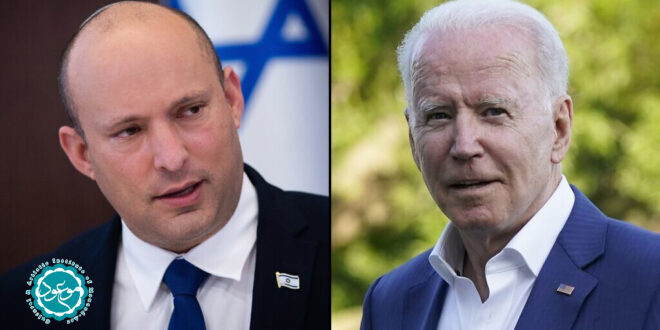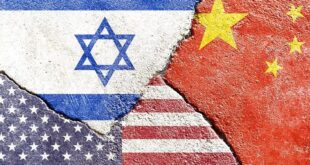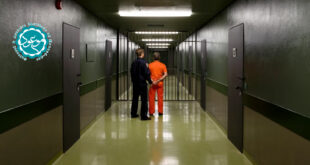Israeli Prime Minister Yair Lapid, a centrist who served as alternative premier to Bennett before he stepped down amid the dissolution of parliament in June, has yet to weigh in publicly on the matter.
Lapid did, however, speak with French President Emmanuel Macron on Monday, and “the two discussed the Iranian nuclear issue at length,” according to an Israeli readout.
NEWSWEEK SUBSCRIPTION OFFERS >
“The Prime Minister reiterated Israel’s opposition to a return to the agreement as well as the need for a clear and unequivocal message that there will be no additional concessions to the Iranians,” the readout stated.
Lapid was said to have “emphasized that the Iranians are continuing to conduct negotiations on an offer which was presented as ‘take it or leave it.'” He “also warned that in that offer, there are new elements that go beyond the limits of the original JCPOA, and that it will pave the way for significant investment to flow into Iran’s terrorist network and to strengthening the Iranian military.”
Israel, which is widely believed to possess a nuclear arsenal of its own, has neither confirmed nor denied possessing such weapons, while Iran has repeatedly denied seeking to build a nuclear bomb.
Speaking at the 10th Review Conference of the Nuclear Non-proliferation Treaty (NPT) in New York on Tuesday, Iranian Ambassador to the United Nations Majd Takht-Ravanchi called for progress in establishing a “Middle East zone free of weapons of mass destruction.”
He alleged that attempts to hold a conference to this end “have been postponed indefinitely because of the U.S.’ opposition, and this has been the persistent policy of the U.S., to turn a blind eye to the nuclear arsenals of the Israeli regime while not supporting the convening of the Conference.”
Iran and Israel have been archfoes for decades, enmeshed in a shadowy conflict involving espionage, assassinations, bombings and proxy wars.
Israel has been opposed to the JCPOA from the outset, with then-Israeli Prime Minister Benjamin Netanyahu openly breaking with then-President Barack Obama over the accord, which was established in 2015 following extensive multilateral negotiations involving China, France, Germany, Iran, Russia, the United Kingdom and the U.S. The agreement allowed for the lifting of international sanctions against Iran in exchange for Tehran severely curbing its nuclear activities.
In 2018, then-President Donald Trump abandoned the JCPOA, aligning himself with Netanyahu and reimposing sanctions on Iran that hindered the Islamic Republic’s trade ties with other parties to the deal. Iran, in turn, began to ramp up nuclear enrichment beyond the caps outlined in the JCPOA.
Biden, who served as Obama’s vice president when the deal was reached, has vowed to negotiate a return to the deal. Nine rounds of talks have taken place in the Austrian capital to Vienna, resulting in a “final” draft text circulated by the European Union earlier this month, to which Iran responded last week, leaving it up to the U.S. to provide its own reply.
As the JCPOA parties awaited Washington’s answer, EU High Representative for Foreign Affairs and Security Policy Josep Borrell described Iran’s notes as “reasonable,” and expressed hope that the U.S. would soon provide a response “that allows us to end the negotiations.”
State Department spokesperson Ned Price said the Biden administration was still “seriously reviewing” the comments from Iran. He said U.S. officials were “encouraged” that Iran appeared to drop some demands such as the removal of the Islamic Revolutionary Guard Corps from the U.S. list of designated foreign terrorist organizations, so the deal appeared “closer” than before, though “gaps do remain.”
Price also said the administration was still “engaging with our partners, with the EU, with our European allies on the way ahead.” And he stated that, “at every step of the process, we have been in touch with our Israeli partners to update them on where we are, to compare notes on the state of Iran’s nuclear program.”
“Of course, Israel, just as we do, has deep concerns about the state of Iran’s nuclear program,” Price said. “For our part, we continue to believe that a mutual return to compliance with the JCPOA is the most effective means by which to address those concerns, but we’ll continue to discuss this with our Israeli partners.”
As the U.S. continued to weigh its options on the JCPOA, Israeli National Security Adviser Eyal Hulata was reportedly set to travel to Washington this week, and Israeli Defense Minister Benny Gantz’s office announced he would be traveling to the U.S. and Japan on Thursday.
“Our relationship is deep with Israel,” Price said Monday. “There are also a number of issues that we have to discuss together, including Israel’s security, our support for it, regional security — but as part of regional security, of course, Iran looms large.”
“In just about every one of our in-depth engagements with our Israeli partners, Iran is a topic of conversation,” he added. “Oftentimes, it is a central topic of conversation, and I expect that will be the case with the discussions this week.”
 Mouood Mouood English Edition
Mouood Mouood English Edition





